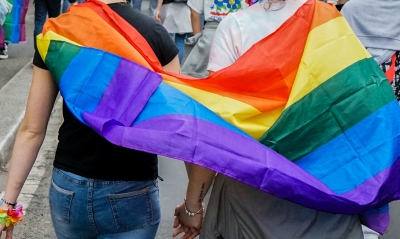Andorra to Taiwan, 34 nations have given legal sanction to same-sex marriage
By IANS | Published: April 23, 2023 11:00 AM2023-04-23T11:00:10+5:302023-04-23T11:10:17+5:30
By Kavya Dubey The Supreme Court of India has stated that a person's sexual orientation is innate and not ...

Andorra to Taiwan, 34 nations have given legal sanction to same-sex marriage
By Kavya Dubey
The Supreme Court of India has stated that a person's sexual orientation is innate and not urban or elitist, going against the Centres contention that petitioners seeking right to marry a partner of the same sex is a "mere urban elitist view for the purpose of social acceptance," in the discourse volleying between the Judiciary and the Legislature over three days in the past week.
"Once something is innate, it cannot have any class bias," said the Chief Justice of India. The Supreme Court went a step further and pointed out to the absence of data to show that same sex marriage is an elitist concept.
The apex court later also observed that "we have already reached the intermediate stage that by decriminalising homosexuality, one can contemplate that people who belong to the same sex would be in stable marriage-like relationships."
The apex court was hearing a batch of petitions challenging certain provisions of the Hindu Marriage Act, Foreign Marriage Act, Special Marriage Act and other marriage laws as unconstitutional on the ground that they deny same-sex couples the right to marry, or alternatively, to read these provisions broadly so as to include same-sex marriage.
Here is broadly how 34 countries around the world have legalised same-sex marriages in their societies.
The earliest country to recognise marriage equality was the Netherlands when in 2000, it became the world's first nation to do so after the Dutch parliament passed the landmark bill by a three-to-one margin, legalising the practice. The law took effect on April 1, 2001.
This law gave homosexual couples the right to marry, divorce and adopt children.
"A marriage," according to the Dutch law, "can be contracted by two people of different or the same sex." After the law came into effect, the Netherlands' Protestant Church, which then represented nearly 12 per cent of its population, announced that individual congregations could decide whether to conduct same-sex wedding ceremonies.
Same-sex marriage, however, is widely accepted in the Netherlands despite Muslim and conservative Christian groups opposing the law.
However, the first homosexual marriage that happened legally in modern times was in 1971, in Minnesota in the US. But the US legalised same-sex marriages in 2015, after its Supreme Court ruled that the Constitution guarantees it throughout the country.
Before the ruling, 36 states and the District of Columbia had legalised marriage equality.
At present, as many as 34 countries (home to 17 per cent of the world's population) have legalised same-sex marriage.
These countries are: Andorra, Argentina, Australia, Austria, Belgium, Brazil, Canada, Chile, Colombia, Costa Rica, Cuba, Denmark, Ecuador, Finland, France, Germany, Iceland, Ireland, Luxembourg, Malta, Mexico, the Netherlands, New Zealand, Norway, Portugal, Slovenia, South Africa, Spain, Sweden, Switzerland, Taiwan, the UK, the US and Uruguay.
Three countries legalised marriage equality in 2022.
Andorra is the most recent country to do so in July 2022 (its legislature unanimously voted to amend the nation's civil union law to include marriage equality for same sex couples); Cuba (after a national referendum); and Slovenia (its Constitutional Court ruled the ban on same-sex marriages violated the country's constitution and gave the Slovenian parliament six months to pass legislation accordingly.)
As far as the process of legalisation went, as many as 23 countries legalised same-sex marriage nationally through legislation. Of these, Australia, Ireland and Switzerland did so only after nationwide votes.
Ten countries have legalised same-sex marriage nationally through court decisions. These are Austria, Brazil, Colombia, Costa Rica, Ecuador, Mexico, Slovenia (its lawmakers later enacted a national legislation), South Africa, Taiwan and the U.S. South Africa and Taiwan enacted this legislation after courts mandated them to do so.
Several studies indicate that overall well-being of homosexual couples, that is in terms of financial, psychological and physical, is enhanced by marriage, and that children of such parents benefit from being raised in secure homes of marital union that is recognised both legally and socially.
And conversely, disallowing such a provision, as also indicated by research, stigmatises such people and their families and invites general discrimination against them.
Disclaimer: This post has been auto-published from an agency feed without any modifications to the text and has not been reviewed by an editor
Open in app